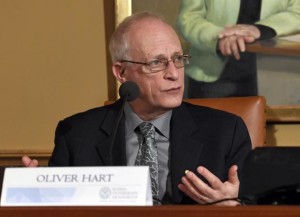The 2016 Nobel Prize winners and their work

Nobel Prize laureate in Economic Sciences Oliver Hart speaks during a news conference at the Royal Swedish Academy in Stockholm, Sweden, Wednesday, Dec. 7, 2016. Hart says he’s not impressed by President-elect Donald Trump’s plans for the US economy. Hart, a Harvard professor, told reporters in Stockholm on Wednesday that he doesn’t yet see “a coherent set of policies” from Trump, but said he’s worried about Trump’s campaign promises of “tearing up trade agreements, imposing tariffs. I don’t think that’s the way forward for the US or the world.” (Photo by HENRIK MONTGOMERY/TT via AP)
STOCKHOLM — This year’s Nobel Prizes will be handed out Saturday for ground-breaking work ranging from the development of the world’s smallest machines to song lyrics that have touched generations of fans.
Here’s a glance at the 2016 Nobel laureates and their work:
The Nobel Prize in Literature: Singer-songwriter Bob Dylan for having created what the Swedish Academy described as “new poetic expressions within the great American song tradition.” Dylan isn’t attending the ceremony.
The Nobel Memorial Prize in Economic Sciences: Oliver Hart and Bengt Holmstrom for their contributions to contract theory, a field of research applicable to anything from CEO bonuses to the deductibles and co-pays for insurance.
The Nobel Peace Prize: Colombian President Juan Manuel Santos for his efforts to end his country’s civil war after five decades of bloodshed.
Article continues after this advertisementThe Nobel Prize in Chemistry: Frenchman Jean-Pierre Sauvage, British-born Fraser Stoddart and Dutch scientist Bernard “Ben” Feringa for work on tiny molecular machines that scientists say can lead to new computer chips, batteries and energy storage systems.
Article continues after this advertisementThe Nobel Prize in Physics: British-born scientists David Thouless, Duncan Haldane, and Michael Kosterlitz for research on superconductors and other unusual states of matter, which the judges said could pave the way for developments in electronics and quantum computers.
The Nobel Prize in Medicine: Japanese scientist Yoshinori Ohsumi for discoveries related to autophagy, the “self-eating” process that lets a cell break down and recycle some of its contents. Breakdowns in the autophagy process have been linked to a number of grave diseases including Parkinson’s, diabetes, and cancer.